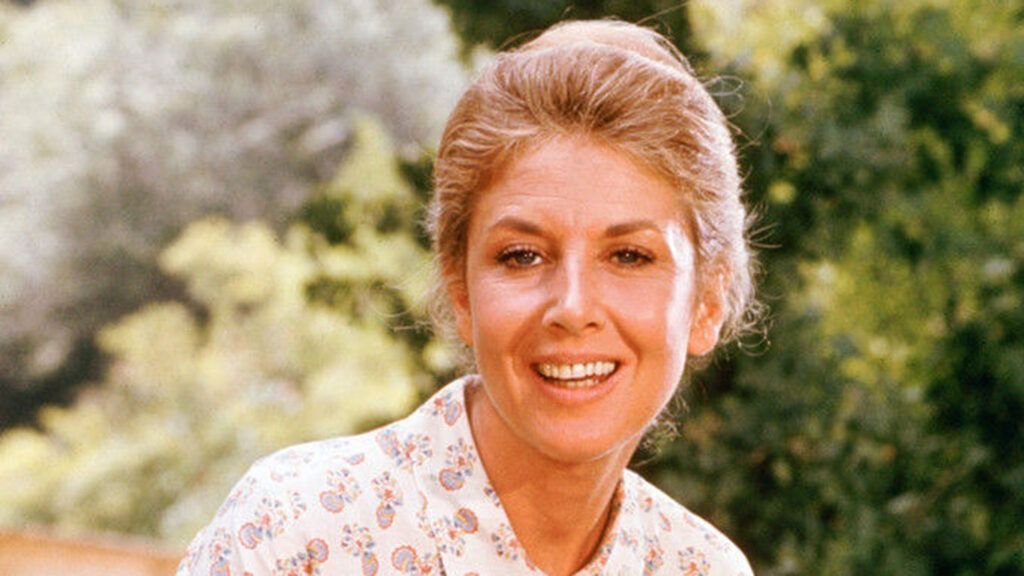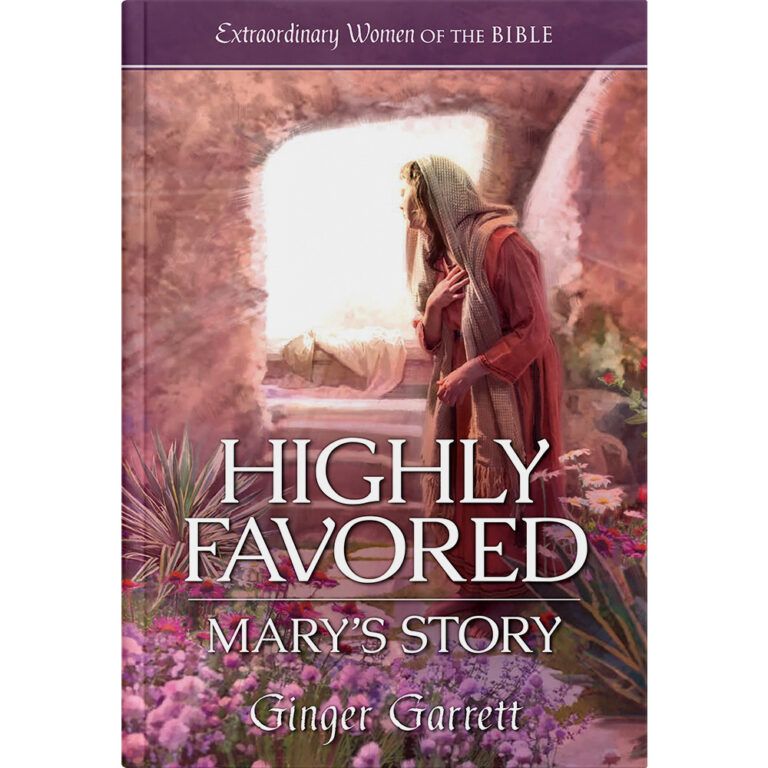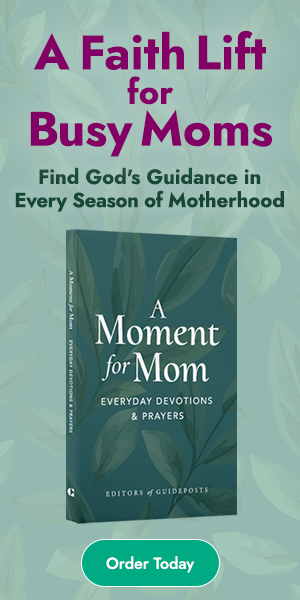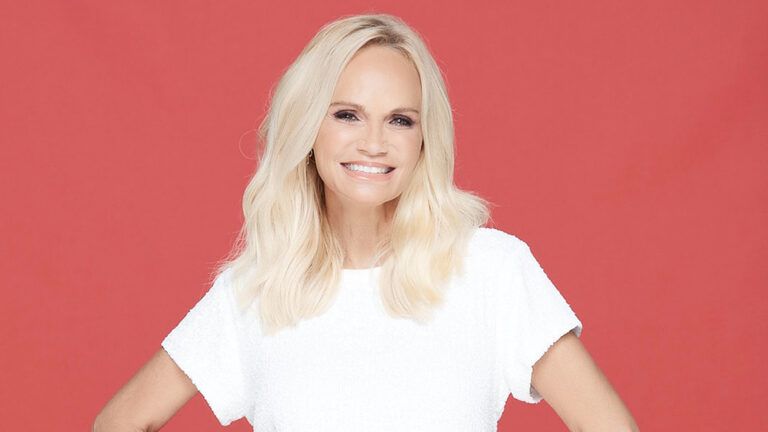People often ask me if in real life I’m anything like Olivia Walton, the character I portray in the television series The Waltons. Well, we do have some things in common, Olivia and I. I’ve lived on a farm, as she does. And, like her, I’m used to big, tightly knit families.
When I was growing up I was the oldest of six daughters, and now I’m the mother of a brood that includes three teen-aged boys, a tankful of fish, a bird, four cats and three dogs.
But while Olivia’s spiritual strength—a strength that surely binds the Walton clan together—is inborn and comes easily to her, my own is the result of much groping, and there are times when I envy Olivia the serenity and assurance that her religion gives her.
Take the matter of prayer, for example, surely a basic thing in religion, perhaps the most basic of all. For people like Olivia, prayer seems to be as natural as breathing. In good times or bad they turn confidently toward God, walking across a solid bridge of faith. But not everyone is so fortunate.
For some people, prayer can be full of doubts and question marks. Are we really getting through to Someone when we pray? Is every prayer really heard? How can we know whether or not it’s being answered? For a long time I wondered about such things myself.
I’m pretty sure that as a child I got off on the wrong foot where prayer is concerned. Nobody was at fault. It was just happenstance.
We Learned children lived on a 21-acre farm in Connecticut where we had a goat named Rebecca, pigs, rabbits and chickens. It was a wonderful place to grow up, in many ways not unlike Walton’s Mountain.
Directly behind our farm was a Catholic seminary. It was supposed to be off limits for us kids, but one Sunday morning, dressed in jeans as usual, my sister Gretl and I climbed over the stone wall separating our property from the seminary.
Curious as cats, we wandered around the grounds until a kindly looking priest spotted us. “May I help you?” he asked.
“We were just looking around,” I said shyly. “We live over there.”
The priest smiled at the two little blond girls standing barefoot before him. “Why don’t you come in and see where we live.”
Our family wasn’t Catholic, but I was intrigued by the seminary tour Father Coffey gave us. We met other priests, too, and almost every Sunday after that, one of my sisters and I would go visit there.
Most of the things kind, old Father Coffey told us Learned girls are forgotten now. But one thing he said made a deep impression. “God,” he assured us earnestly, “answers all prayers.”
This was welcome news to me, because I had been praying fervently that my parents would give me a new bicycle. I wanted that bike desperately, and when Father Coffey told us that all prayers are answered, I knew—I was just positive—that I’d get my bike.
In fact, as I climbed back over the wall that day, I could visualize a chrome-plated red Schwinn, complete with a basket on the front, already sitting in our driveway.
But the bike never came. Instead, my parents gave one to my sister Dorit. All I got, I remember vividly, was a pair of new shoes.
I was crushed. How could this have happened? Wasn’t God supposed to give me what I asked for? From that moment on, as a child, I think I tended to equate prayer with disappointment and to regard it with doubt and hesitancy.
This attitude was reinforced a few years later when a new job for my father took our family from Connecticut to Europe. We hadn’t lived there very long before I began to be passionately interested in ballet.
My one ambition now was to become a ballerina, and all day I’d dance through the house praying fervent prayers. Eventually an audition was arranged for me in England with the famous Sadler’s Wells ballet company.
While waiting for some word, I kept reminding God of my aching desire. “You know how much I want this,” I told Him.
But, to my despair, word came that the ballet company didn’t want me. I was too tall, they said, and besides my feet were flat. Again I was heartbroken, but more than that, confused. If prayer as heartfelt as mine produced only negative results, something must be wrong somewhere.
Resignedly I accepted an alternative–drama school. And gradually, although it was difficult at first, I began to forget all about being a dancer. I discovered a whole new fascinating world—the world of the theater. In drama school, moreover, I met Peter Donat, the man who later became my husband.
By this time the thought surely should have crossed my mind that an apparently negative response to prayer can be a form of guidance. But I was too busy with the demanding task of building a stage career. It was not a spectacular one, but I found it exciting and satisfying.
By 1972 I was acting regularly with a San Francisco theatrical company. I had been with them for several years and was content with my work. But there were personal difficulties in my life that I could not seem to resolve, and deep inside I was miserable.
Once again I called out to my dim concept of God for help, and once again there seemed to be no answer. Then in the spring of that year my agent urged me to go to Los Angeles and look into television work.
The idea did not appeal to me. I flinched from the thought of leaving my three sons and my home in the most beautiful city in America to enter a new and highly competitive field where I had little experience.
But my agent was persistent and persuasive, and so finally—still praying for relief from my problems—I went to Hollywood and made several screen tests, including one for the role of a rural housewife in an upcoming CBS television series.
A month later, my agent called me again. “Michael,” he said, “they want you for The Waltons. You remember–it’s the show about a family living in the hills of West Virginia during the Depression. You’ll be the mother, and shooting starts immediately.”
My emotions were mixed, at best. The professional side of me was pleased, but the personal side wasn’t. Ahead of me I saw the daily grind of a television series, the loneliness and dislocation of being away from my family…and I wasn’t too sure that I could relate to this fictional Olivia Walton anyway.
She seemed so serene, so settled, so secure in her faith, whereas I…
As things turned out, all my fears were groundless. Almost from the very first day of filming, I found in the cast and crew of The Waltons warm and loving new friends, another close family to give me all the support and comfort I needed.
That first year was full of endless excitement: the tremendous success of the show, the unexpected Emmy that came my way. But something else excited me even more, and that was the evolving character of Olivia Walton herself.
It was very strange. An actress is supposed to “interpret” or “bring to life” a fictional character, not be influenced by one. And yet I found myself being profoundly influenced by Olivia Walton.
Like me, she often faced personal problems. Her problems were not exactly like mine, and yet I found myself admiring the way she was able to handle setbacks and difficulties through a strong and simple faith in God.
In show after show Olivia revealed to me—as indeed she keeps on doing—a basic truth that had eluded me for years—the truth that, as old Father Coffey said, God can and will answer prayers, in His own way and in His own time, not in ours.
Perhaps His answer to prayer is sometimes simply, “No,” as in the case of the bicycle that I’m sure now I didn’t need as much as my sister did. Perhaps it’s a negative that leads one in a new and better direction, as it did in my turning from ballet to the theater.
Perhaps it consists in meeting a new person (yes, even a fictional one) whose life and character make such an impact that your own life is changed.
Sometimes I am astonished at the change in myself. In my kitchen the other day, when I heard on the radio that an airliner with its landing gear stuck was circling the Los Angeles airport, I did what Olivia would have done. I knelt down on the kitchen floor and prayed for the safety of those people.
The plane finally landed safely. No one was hurt. Did my small prayers help? I know what Olivia would say. She would say that a Higher Power watches over us all–and that somehow prayer enables this Power to carry out the best designs for us.
Trusting. That’s what Father Coffey meant by prayer and that’s what Olivia Walton lives her life by. It’s taken time, but I’ve come to see that all prayers are answered–if one discovers first that prayer is acceptance and trust; it’s releasing doubt, and relying completely, in the end, on God’s ultimate wisdom.
For more inspiring stories, subscribe to Guideposts magazine.






